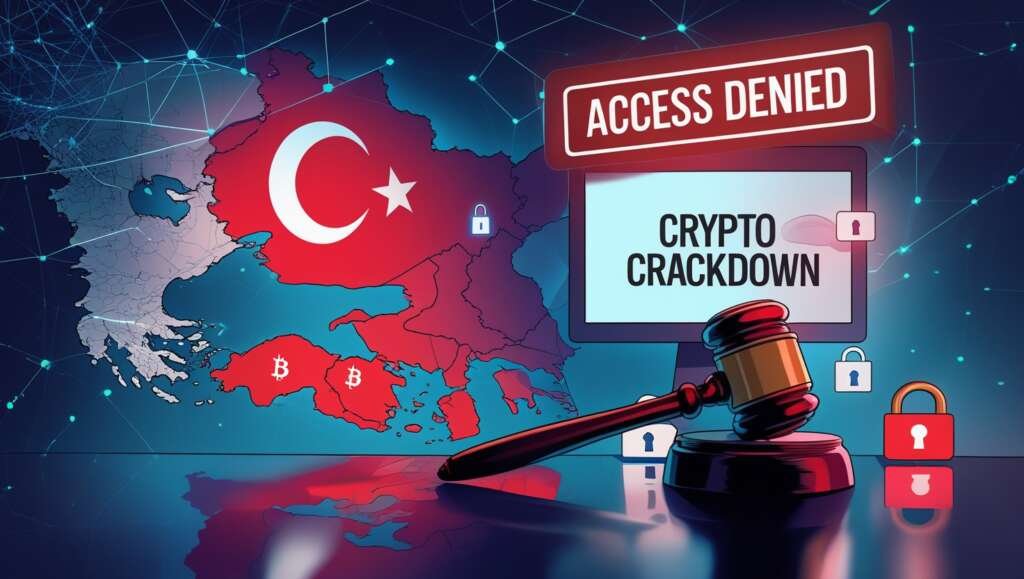Turkey has taken a decisive step by ordering all Internet Service Providers (ISPs) to block access to PancakeSwap and other crypto-related platforms in the latest sweeping crackdown efforts. The country’s financial watchdog, Capital Markets Board (CMB), made the move on Wednesday, July 3, adding that it had taken legal action against platforms offering unauthorized crypto asset services to Turkish residents.
The latest movie sums up the CMB’s crackdown efforts and tightening control over unlicensed DeFi platforms operating within the country. As of this writing, the regulatory body has yet to release the full criteria behind the enforcement.
PancakeSwap, 45 Others Get the Hammer
The CMB initiated the legal action against the foreign platforms under the Capital Markets Law articles 99/3 and 128/1(a). PancakeSwap, a popular DEX platform with over $325 billion in trading volume in June, was among the high-profile sites that faced the CMB’s hammer.
This is the first time Turkey has taken legal action against a DeFi platform, intensifying crypto restrictions that first started with banning payments in 2021 and mandating KYC requirements for transactions above 15,000 TL. PancakeSwap is yet to respond to the news.
Turkey Continues to Tighten the Screws
Turkey’s crackdown has intensified since March, reflecting a strong regulatory push. It was then that the CMB received approval for full oversight of crypto services operating in the country. In addition, new frameworks were established over time to govern licensing and compliance.
After the CMB was granted sweeping oversight, global DeFi platforms were either compelled to register or face access blocks. In February, one of the rules mandated users to provide information for crypto transactions above 15,000 Turkish lira. If a provider is unable to obtain sufficient customer information, the transaction would be flagged “risky.”
In late 2024, Turkey introduced stricter anti-money laundering measures amid rising use of cryptocurrencies in the country. Since the lira suffered from high inflation and volatility, citizens decided to pivot to crypto. The government responded with tighter AML measures to prevent illicit capital inflows and terrorism financing via cryptocurrency.
What the Regulatory Crackdown Means for Turkish Users
Although buying and holding crypto assets is legal, digital asset payments remain banned, a move that was heavily criticized by the crypto community. With DeFi platforms like PancakeSwap restricted, users relying on the platform for trading, staking, swapping, and yield farming will lose access, unless they circumvent via VPNs.
Since DeFi platforms are most affected by the restrictions, centralized exchanges will get more traction among users. These exchanges are regulated platforms, meaning they will continue offering services to users. This could potentially lure users away from DEXs to CEXs, signalling the end of DEX platforms in the country.
For Turkey’s crypto ecosystem, the crackdown may undermine growth and dampen innovation. DeFi projects with yield aggregation might face regulatory uncertainty, pushing them back from emerging.
What’s Next for Turkey’s Crackdown?
Turkey joins other countries, such as Kazakhstan, Russia, Thailand and Venezuela in blacklisting unregistered crypto services. This shows the global stance on tight crypto regulations. Turkey is strengthening centralized platforms with its no license, no access policy, explaining how far the country is willing to go on its legal push for a safer crypto ecosystem.
The question now is, “Can innovation thrive in a tightly monitored environment?” Turkey may be unwilling to ease its regulatory push. This may also inspire other countries to follow suit.
DEXs like PancakeSwap may be unbanned in the future if they seek a license. If they retreat, it could force users into using VPNs to circumvent blocks, which may attract further legal consequences. Turkey may need to navigate the crypto landscape with caution or risk discouraging crypto adoption momentum.




